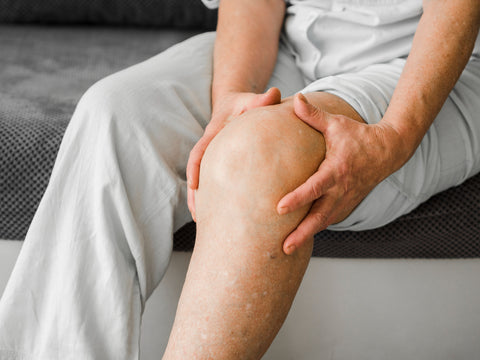Collagen is a complex structural protein, comprising of three chains, wound together in a triple helix (1). It helps give our skin, nails, joints, tendons, ligaments and bones strength and a solid structure, acting as “glue” or “gel” that holds everything together.
Recently, there has been a lot of research into the ability of collagen supplementation to help maintain our joints, relieve tension, prevent bone loss, promote bone formation and boost our muscle mass.
Because of its ability to support our joints, it is believed to be beneficial for athletic performance.
Other benefits include improved skin, hair and nail health, boosting cardiovascular health, gut health and cognitive function, more specifically mood.
Another potential benefit is aiding weight loss by improving metabolism.
Generally, researchers have found that it was safe for all participants who took it and showed significant improvements in protein synthesis.
Although the body can produce collagen naturally by breaking down proteins found in food, our ability to produce it and our bone mass reduce as we age.
Other risk factors such as a diet high in sugar, smoking and increased sun exposure also contribute to depleting levels.
This leads to an increase in the risk of developing osteoarthritis and joint disorders (2) which can lead to bone fractures.
Related diseases develop from a lack of collagen-rich foods, genetics, nutritional deficiencies and digestive problems, which affect our production within the body. Deficiency can result in joint stiffness, pain and swelling.
Therefore, if you have any joint concerns, stiffness, aches or joint deterioration you should think about a collagen supplement to support healthy bone mineral density.
Studies show it has been used as an effective treatment and has a role in preventing osteoarthritis (1).
Natural sources include dark, leafy greens, citrus fruits, spirulina, olives, flaxseed and walnuts, prunes, tomato, chocolate and manuka honey.
Also, Vitamin C contributes to collagen formation for the normal function of blood vessels, bones, cartilage, gums, skin and teeth.
Natural sources of Vitamin C include citrus fruits, cherries, peppers, kiwi, broccoli and strawberries.
Collagen is formed of 19 different amino acids, the most dominant of these amino acids are proline, glycine, alanine and hydroxyproline.
Proline helps protect your blood vessels, improve your joint health and support cardiovascular health. Glycine has a role in cellular function and DNA synthesis and helps form creatine which promotes healthy muscle growth and energy production, during physical activity.
Proline-rich foods include seeds, mushrooms, cabbage, yoghurt and seaweed. Glycine-rich foods include wholegrains, legumes, seeds, asparagus, cabbage, tofu, seaweed and cashews (1).
There are many different types such as bovine, chicken, egg and fish collagen. Type one collagen supplements are usually used for skin health and appearance, whereas type two supplements may be more beneficial for blood vessels and organ function.
Hydrolysed is thought to be the best form as it is best absorbed by the body (compared to raw forms and gelatin, which is a broken-down, extracted form of collagen.
Researchers believe that it accumulates in our cartilage and stimulates our tissues to produce more, leading to a decrease in inflammation and reduced pain (2).
Research
Joint concerns are a common problem during menopause.
A 12-month study showed that women who took Calcium, Vitamin D and 5g of collagen daily had significantly lower levels of proteins that promote bone breakdown and a lower loss of bone mineral density, than those who took only Calcium and Vitamin D (2).
Another study involving post-menopausal women showed that those who took collagen daily for 12 months increased their bone mineral density by 7%, compared to those who didn’t take it (2).
A study was carried out on osteoarthritis individuals. The group who took type two collagen supplements for 180 days demonstrated a significant reduction in pain, stiffness and an increase in physical function compared to placebo ().
Athletes with an activity-related joint injury who took collagen hydrolysate were assessed by a physician who found there was a significant reduction in joint pain at rest, joint pain when walking, joint pain when standing, joint pain when carrying objects and joint pain when lifting, compared to placebo.
Further measurements were taken and an improvement in joint pain when running in a straight line and changing direction was also seen (4).
In healthy subjects who took undenatured collagen, there was a significant increase in range of motion flexion and range of motion extension, versus placebo (5).
This shows its effectiveness in supporting bone health in healthy individuals and those with symptoms of osteoarthritis or injury.
Supplements
HealthAid Collagen Complex contains hydrolysed Collagen, the most bioavailable form. It also contains Vitamin C, which contributes to collagen formation, for the normal function of bones, cartilage, teeth and blood vessels.
Vitamin E and Beta-Carotene, which provide protection against oxidative damage and Silica, which helps in strengthening the body's connective tissue.
This is a great alternative for someone looking for supreme joint support or someone who has tried conventional joint formulas which contain well-known ingredients such as Glucosamine and Chondroitin, Turmeric and Vitamin D and they are no longer effective.
Research on bone health is limited, so more human research needs to be done, but current research is pointing in the right direction, so why not try it for yourself as a natural alternative to prescription anti-inflammatory drugs?
Related Articles
- Strains and Sprains | HealthAid
- Tennis Elbow | HealthAid
- Benefits of Vitamin C: The Protective Vitamin! | HealthAid
Sources
- Collagen Benefits, Nutrition, Types, Supplements, Foods - Dr. Axe (draxe.com)
- Health Benefits of Collagen: Pros, Cons, and More (healthline.com)
- Efficacy and tolerability of an undenatured type II collagen supplement in modulating knee osteoarthritis symptoms: a multicenter randomized, double-blind, placebo-controlled study - PubMed (nih.gov)
- 24-Week study on the use of collagen hydrolysate as a dietary supplement in athletes with activity-related joint pain - PubMed (nih.gov)
- UC-II Undenatured Type II Collagen for Knee Joint Flexibility: A Multicenter, Randomized, Double-Blind, Placebo-Controlled Clinical Study - PubMed (nih.gov)
Any information or product suggested on this website is not intended to diagnose, treat, cure, or prevent any medical condition. Never disregard medical advice or delay in seeking it because of something you have read on this website. Consult your primary healthcare physician before using any supplements or making any changes to your regime.






